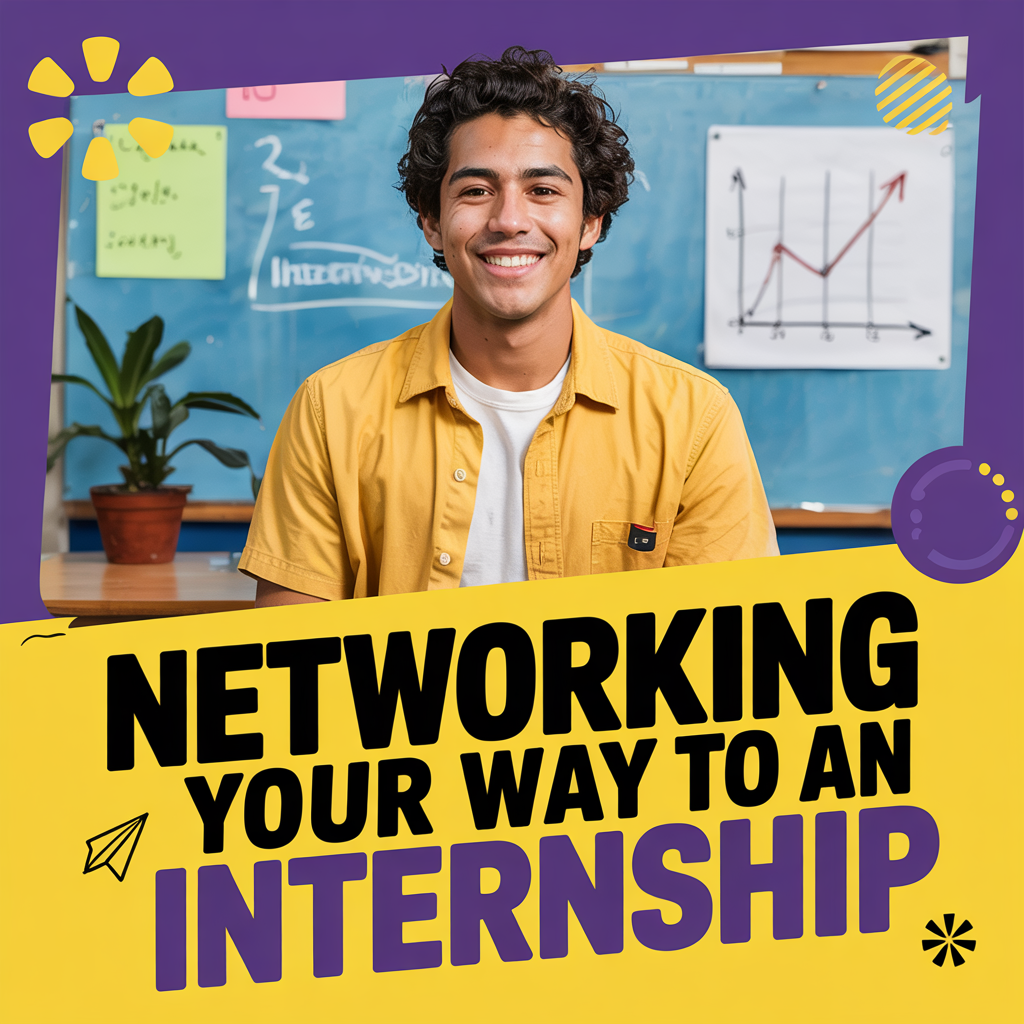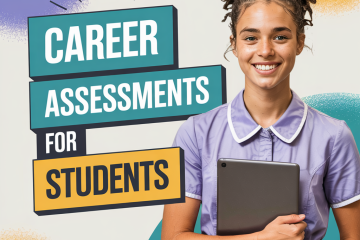Networking Your Way to an Internship: Using Connections and Informational Interviews to Open Doors

While online job boards and application portals are essential tools in an internship search, they often represent only a fraction of the available opportunities. A significant portion of internships, particularly those less formally advertised, are often accessed through networking and personal connections. Leveraging your network and proactively engaging in informational interviews can unlock access to this “hidden internship market,” providing a competitive advantage and expanding your options beyond publicly advertised roles.
This guide will explore the power of networking, focusing on informational interviews as a key strategy to build connections, gain industry insights, and ultimately, open doors to internship opportunities that might otherwise remain undiscovered. Understanding and utilizing networking is a proactive and valuable approach to internship hunting, complementing traditional application methods.

Beyond the Job Boards: The Power of Networking in Internship Hunting
Relying solely on online applications can limit your internship search to publicly advertised positions, which are often highly competitive. Networking offers a more nuanced and often more effective approach by tapping into the “hidden job market” – opportunities that are not widely publicized. The benefits of networking for internship seekers are multifaceted:
- Uncovering Hidden Opportunities: Many internships, particularly within smaller companies or specific industries, are filled through referrals and word-of-mouth rather than formal public postings. Networking can expose you to these unadvertised roles.
- Gaining Insider Information: Networking provides access to individuals working in fields that interest you. These professionals can offer invaluable insights into industry trends, company cultures, and specific internship experiences that are not readily available online.
- Building Relationships and Mentorship: Networking is about building genuine connections. Informational interviews can evolve into mentoring relationships, providing ongoing guidance and support throughout your career journey.
- Creating a Personal Brand: Proactive networking demonstrates initiative, communication skills, and a genuine interest in your chosen field. It helps you build a personal brand and become known within your professional community. Tools like Cirkled In can help you craft a student profile that supports your brand and showcases your experiences as you grow your network.
- Increasing Referral Potential: As you build your network, you increase the likelihood of receiving referrals for internship positions. A referral from a trusted contact can significantly enhance your application’s visibility and credibility.
Therefore, integrating networking into your internship search strategy is not merely an optional add-on, but a crucial element for expanding your reach, gaining valuable insights, and maximizing your chances of securing a desirable internship.
Informational Interviews: Your Networking Superpower
Informational interviews are a highly effective networking tool, particularly valuable for students and those early in their careers. They are not job interviews in disguise, but rather conversations designed to gather information, explore career paths, and build connections. The primary purpose of an informational interview is to:
- Learn About a Specific Industry or Role: Gain firsthand knowledge about a particular career field, industry sector, or specific job function from someone working in that area.
- Seek Career Advice and Guidance: Obtain insights and advice from experienced professionals regarding career paths, skill development, and industry trends.
- Expand Your Professional Network: Build connections with individuals in your field of interest, expanding your network for future opportunities and mentorship.
- Explore Internship Possibilities (Indirectly): While not the primary focus, informational interviews can sometimes indirectly lead to internship opportunities by making connections and demonstrating your interest to potential employers.
Informational interviews are a low-pressure, mutually beneficial way to network. They provide valuable information to you while offering the professional an opportunity to share their expertise and potentially connect with promising talent. Approach them as learning conversations, focused on building relationships and gaining knowledge, rather than directly soliciting a job or internship.
Step 1: Identifying Your Network and Potential Contacts
The first step in leveraging informational interviews is identifying individuals within your existing network and beyond who might be valuable contacts. Think broadly and consider various categories of connections:
- University/College Network:
- Professors and Academic Advisors: Faculty members often have extensive professional networks and industry connections. They can provide valuable advice and potentially connect you with alumni or industry professionals.
- Alumni Network: Your university’s alumni network is a readily available resource. Alumni often are willing to assist current students and share their career experiences. Utilize alumni directories or online platforms to identify alumni working in your fields of interest.
- Career Services Department: Career services professionals often have connections with employers and can assist in identifying relevant contacts for informational interviews.
- Personal Network:
- Family and Friends: Inform your family and friends about your internship search and your interest in informational interviews. They may have connections you are unaware of.
- Family Friends and Acquaintances: Extend your reach beyond your immediate circle. Consider family friends, neighbors, or acquaintances who work in fields that interest you.
- LinkedIn Connections: Utilize LinkedIn to identify individuals in your extended network – second or third-degree connections – who hold roles or work in companies that align with your internship goals.
- Expanding Beyond Your Immediate Network:
- Industry Events and Conferences: Attending industry events, even virtual ones, can provide opportunities to meet professionals and initiate connections.
- Professional Associations and Organizations: Join student chapters or participate in events hosted by professional associations related to your field. These organizations often facilitate networking opportunities and mentorship programs.
- Online Professional Communities: Engage in online communities, forums, or groups related to your industry on platforms like LinkedIn or industry-specific websites. Participate in discussions and identify individuals whose expertise you admire.
Begin by mapping out your existing network and identifying potential contacts within these categories. Start with individuals you already have some level of connection with, as these initial outreach attempts are often more comfortable and successful.
Step 2: Reaching Out and Requesting Informational Interviews
Once you have identified potential contacts, the next step is to reach out and request an informational interview. A well-crafted and personalized outreach message is crucial for securing a positive response.
- Personalized Outreach is Key: Avoid generic, mass-produced requests. Craft each outreach message individually, demonstrating that you have researched the person’s background and are genuinely interested in their specific experience and insights.
- Utilize Email or LinkedIn (Professional Platforms): Email is generally a professional and effective method for requesting informational interviews. LinkedIn messaging can also be appropriate, particularly if you are connecting with someone through the platform. Avoid casual social media platforms for initial professional outreach.
- Subject Line – Clear and Concise: Use a clear and concise subject line that immediately conveys the purpose of your email. Examples:
- “Informational Interview Request – [Your Name] – [Your University/Affiliation]”
- “Networking Request – Student Interested in [Industry/Field]”
- “Informational Interview Inquiry – [Connection – e.g., Alumni, Referred by Professor X]”
- Body of the Message – Polite and Specific:
- Polite Introduction: Start with a polite and professional greeting, addressing the person by name.
- State Your Purpose Clearly: Clearly state that you are a student interested in learning more about their career field and are requesting an informational interview. Explicitly mention that you are not seeking a job at this time, to alleviate any pressure.
- Explain Why You are Contacting THEM Specifically: Reference something specific about their background, career path, company, or work that interests you. This shows you have done your research and are genuinely interested in their insights. Mention a specific project, article, or accomplishment you admire.
- Keep it Concise and Respectful of Their Time: Keep your message brief and to the point, typically no more than a few paragraphs. Acknowledge that you are requesting their valuable time and express flexibility in scheduling.
- Suggest a Timeframe (Optional): You can suggest a timeframe for a brief 20-30 minute conversation (e.g., “I would be grateful for 20-30 minutes of your time in the coming weeks”).
- Professional Closing: End with a professional closing, your name, university/affiliation, and contact information.
Example Outreach Email:
Subject: Informational Interview Request – [Your Name] – [University Name]
Dear Mr./Ms. [Contact Last Name],
My name is [Your Name], and I am a [Year] in [Major] at [University Name]. I am reaching out to you because I am very interested in pursuing a career in [Industry/Field], and I was particularly impressed by your work in [Specific Project/Area] at [Company Name], as highlighted in [Source – e.g., LinkedIn profile, article].
I am currently exploring internship opportunities in the field of [Industry/Field] to gain practical experience and learn more about different career paths. I would be incredibly grateful for the opportunity to schedule a brief informational interview with you, perhaps for 20-30 minutes, to learn more about your career journey, your experiences at [Company Name], and any advice you might have for a student interested in this field.
I understand your time is valuable and would be very flexible to work around your schedule. Thank you for considering my request.
Sincerely,
[Your Name]
[University Name]
[Your Email Address]
[Your Phone Number (Optional)]
Be prepared for not everyone to respond. Informational interviewing is a numbers game to some extent. Send out multiple personalized requests and be persistent, but also respectful if you do not receive a response.
Step 3: Conducting Effective Informational Interviews: Asking the Right Questions
Once you have secured an informational interview, preparation is key to making the most of the conversation. Remember, the focus is on learning and building a connection, not directly asking for a job. Prepare thoughtful and insightful questions that demonstrate your genuine interest and allow you to gain valuable information.
- Focus on Open-Ended Questions: Frame questions that encourage detailed responses and insights, rather than simple “yes” or “no” answers. Start questions with “How,” “What,” or “Why.”
- Question Categories to Explore: Consider asking questions in these categories:
- Career Path and Experience:
- “Could you walk me through your career path and how you arrived in your current role?”
- “What are some of the most rewarding and challenging aspects of your work in [Industry/Field]?”
- “What skills and experiences have been most crucial to your success in this field?”
- Industry Insights and Trends:
- “What are some of the key trends and challenges facing the [Industry/Field] industry currently?”
- “What advice would you give to someone entering this field now?”
- “What are some resources or publications you would recommend for staying informed about this industry?”
- Internship and Entry-Level Advice:
- “From your perspective, what makes a student successful in landing an internship in [Industry/Field]?”
- “What are some common misconceptions about internships or entry-level roles in this field?”
- “Are there any specific skills or experiences you would recommend students focus on developing to be competitive in this industry?”
- Company Culture and Work Environment (If relevant to their company):
- “Could you describe the company culture at [Company Name]?”
- “What do you enjoy most about working at [Company Name]?”
- Career Path and Experience:
- Active Listening and Engagement: During the interview, practice active listening. Pay close attention to the person’s responses, ask follow-up questions based on their answers, and show genuine engagement throughout the conversation. Treat it as a genuine conversation, not just a question-and-answer session.
- Be Respectful of Time: Stick to the agreed-upon timeframe for the interview. Be mindful of the person’s schedule and end the conversation promptly and politely.
Step 4: Following Up and Nurturing Your Network
The informational interview is not the end of the networking process, but rather the beginning of a potential professional relationship. Following up promptly and nurturing your network are crucial for maximizing the long-term benefits of your networking efforts.
- Send a Thank-You Note Immediately (Within 24 Hours): Send a personalized thank-you email within 24 hours of the informational interview. Express your gratitude for their time and valuable insights. Mention something specific you discussed that you found particularly helpful or interesting to personalize the thank-you note.
- Stay in Touch (Periodically, but Don’t Be Pushy): Maintain the connection by staying in touch periodically, but avoid being overly frequent or demanding. Connect with them on LinkedIn. Send an occasional update on your career progress or share an article or resource you think they might find interesting, referencing your previous conversation. Nurturing a professional relationship is a long-term process.
- Respect Boundaries: Be mindful of professional boundaries and avoid over-contacting your network connections. Respect their time and availability. Focus on building genuine relationships, not just transactional networking for immediate gain.
Leveraging Connections for Internship Leads: Turning Networking into Opportunities
While informational interviews are primarily about gaining information and building relationships, they can indirectly lead to internship opportunities. As you build your network and make positive impressions, your contacts may become valuable sources of internship leads and referrals.
- Subtle Inquiries (Appropriate Timing): Towards the end of an informational interview, if the conversation flows naturally and you have established a good rapport, it may be appropriate to subtly inquire about internship opportunities within their company or industry. Phrase your inquiry in a way that shows you are primarily interested in their advice and perspective, rather than directly asking for a job. For example, “Based on our conversation today, I am even more excited about pursuing internships in this field. Do you have any advice for students seeking internships at companies like [Company Name], or more broadly within [Industry]?”
- Follow-Up Inquiries (If Appropriate): If during the informational interview, the contact expresses willingness to help or suggests potential opportunities, follow up politely and professionally. For example, if they mention a contact at another company, ask if they would be willing to make an introduction.
- LinkedIn Updates – Keep Your Network Informed: Keep your LinkedIn profile updated with your career progress and internship search goals. Your network connections may see your updates and be reminded of your internship aspirations, potentially leading to unsolicited opportunities or referrals.
Remember that networking is a long-term investment. Focus on building genuine relationships and gaining knowledge, and internship opportunities may naturally arise as a result of your proactive networking efforts.
Action Plan: Start Networking and Conducting Informational Interviews Today!
Begin leveraging the power of networking and informational interviews in your internship search with these actionable steps:
- Identify 5-10 Potential Contacts: Brainstorm and list 5-10 individuals within your network and beyond who work in fields that interest you and who might be valuable contacts for informational interviews.
- Craft Your Outreach Template: Develop a personalized email template for requesting informational interviews, ensuring it is clear, concise, and tailored to each individual contact.
- Send 2-3 Informational Interview Requests This Week: Commit to sending out 2–3 personalized informational interview requests this week to initiate your networking efforts. Tools like Cirkled In can help you organize your contacts and experiences as you build your professional presence.
- Prepare Questions for Your First Interview: Once you secure an informational interview, prepare a list of thoughtful questions to guide the conversation, focusing on learning and gaining insights.
- Schedule Time for Networking Regularly: Allocate dedicated time each week to continue networking and conducting informational interviews. Make networking a consistent and proactive part of your internship search strategy.
Final Thought: Networking – Your Proactive Path to Internship Success
Networking and informational interviews are not just supplementary tactics in your internship search; they are a proactive and powerful path to unlocking hidden opportunities and gaining a competitive edge. By investing time in building genuine connections, actively seeking information and advice, and nurturing your network, you significantly increase your chances of securing a fulfilling and career-launching internship. Embrace networking as a core strategy, and you will find yourself accessing a wider range of opportunities and paving a more proactive path to internship success.
Need more tips on college applications, scholarships, or just how to survive this whole process? Cirkled In has your back—check out Cirkled In resources to help you through every step of your college journey!
Check out Cirkled In and start owning your future today!
![The Future of Work in [Specific Industry]](https://www.cirkledin.com/library/wp-content/uploads/2025/03/Career-Planning-31-360x240.png)


0 Comments